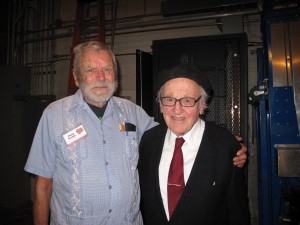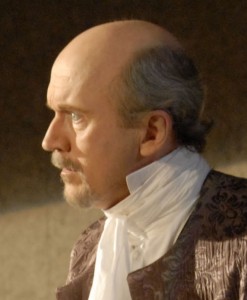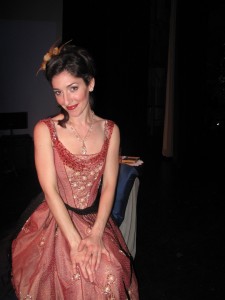Before I begin my review, I want to make a confession. I love opera. In particular, I love opera-in-the-small. I show that love by writing these reviews and by my support for two small local opera companies. I am a member of the West Bay Opera Guild and a member of the Pocket Opera Board of Directors.
But I do not write a favorable review because I am a member of the company. Rather, the fact that (in my opinion) they produce such wonderful performances explains both why I write the reviews I do and why I support the companies. Caveat Emptor.
It’s only a few weeks ago that I wrote my SPLASH review of West Bay Opera’s production of La Traviata, concluding with:
“I think that in previous productions I was sort of tuned out by the end of Act II. I listened to the great music in the last act and observed the goings on, but I no longer felt involved. But somehow last night I stayed with the characters, warts and all. I attributed Alfredo’s gross behavior to his youth (he was barely out of his teens); I sympathized with Violetta’s sorrow regardless of its being partially her own fault. I even forgave Germont when he publicly admitted that he had been a fool. As the act ended I felt emotionally satisfied in the complex combination of sorrow in her death and joy in their brief moment of mutual reconciliation.”
That was last month. Yesterday as the final quiet chords were played by the piano and eight-piece orchestra of Pocket Opera, I was not just emotionally “satisfied”. I was emotionally saturated, emotionally drained, emotionally exhausted. Tears were streaming down my cheeks. The lump in my throat threatened to become audible. I was overcome by the whole wonderful mystery of Life and Death. Can one ask more of an opera?

Jordan Eldredge (Baron), Nicolas Aliaga (Marquis, Director, and Production Manager), Diane Squires (chorus)
In a Pocket Opera newsletter, Director Nicolas Aliaga wrote:
“Violetta is not simply the carefree courtesan often seen performing Sempre Libera. Rather, she is a lovely, innocent young woman, closer to an ing�nue at heart, despite the fact that she is a victim of the era in which she lives. With so few options available to women at the time, Violetta is forced to rely on her beauty for survival; however, in our intimate Pocket production, we hoped to convey just how vulnerable and fragile and brimming with hope she secretly is. . . . Violetta simply desires to be loved�by her society friends in the sparkling first act, by young Alfredo in the second act, and finally, by God in the third act, as she begs that her lifestyle not keep her from Heaven. It is truly the universal theme that has drawn audiences to this masterpiece�I hope it touches you as much as it has me.” – –
It did, Nicholas. Oh how it did.
It wasn’t just me. At the last meeting of the Pocket Opera Board everyone who had seen either of the two performances agreed that this was not only one of the best La Traviatas we had ever seen (we might all be biased in that judgment) but one of the best Pocket Operas we had ever seen. I can’t explain why or how, and I’ve decided it’s a mistake to attempt an explanation. But somehow it’s related to smallness and youth.
Heidi Moss was not doing a superb job of acting the part of Violetta; she was feeling the intense joy and bitter sorrow that Violetta felt. Robert Vann was not acting his nervous hesitation before he started his Drinking Song; he was nervous and shy about singing in front of the 300 or so people in the audience.
In Act III Lee Strawn was not acting his remorse for his unfeeling rigidity in Act II: he was genuinely wishing he could undo that whole scene. Anyhow, the whole opera was a “magic moment” – and one should never try to explain magic.
Speaking of small, I was witness to another aspect of the smallness of Pocket Opera: individuals must frequently take on more than one role.
You may have noticed that many of the pictures accompanying this article don’t seem to have much to do La Traviata. Here’s the story.
You, the reader, have come to expect pictures in a review, and I only had two. My friend Elsa agreed to bring her camera to the opera and shoot some. Obviously she couldn’t take any during the performance, and there was no chance before it, so we went backstage immediately afterward. Where we found organized chaos.
The production manager this season is Nicolas Aliaga who doubled as Director for this performance and also played the role of Flora’s sugar daddy, the Marquis. With the help of a couple assistants he was frantically packing up props and getting them out of the theater. He had to get it all done in 17 minutes or Pocket Opera would have been charged an extra hours rent by the theater. That job had a much greater priority than helping Elsa get pictures! (We did get him to stand still for 20 seconds so you can see what he looks like above).
Also, most of the cast had done a quick change and many of them had left. The best Elsa could do was collar the ones still there and get them to pose for pictures. In street clothes. In combinations that had nothing to do with the setting or actions of La Traviata. But what a nice looking bunch of young people!
* * * * * * * * * * * * * * * * * * * * * * * * * * * * * *
The above review was written immediately after the opening performance on July 10. However, for various reasons it was not posted until after the final performances on July 17-18. This delay gives me an opportunity to share a couple of additional thoughts I had after seeing it again a week later.
Even when there are no changes in cast, each performance of the same opera is unique. There is a certain electricity about the opening performance presenting the work to a live audience for the first time. The third performance a week later will lack that novelty, but may more than compensate for it by being more polished. For example, on opening night there was a small mishap: Violetta’s wig came off. The singers on stage covered it and repaired the damage so skillfully that I suspect most of the audience was unaware of anything unusual. Anyhow, the mishap was not repeated when I saw it again.
But more important to me are the differences in what I notice. I could give several examples, but I’ll limit myself to just talking about the final climactic last minutes of the performance. The first time I was so overcome by emotion at this point that I couldn’t take in any of the details of that final two minutes. I only knew that not a single detail was out of place.
Yesterday my emotion didn’t take me by surprise; I would describe it as perhaps less intense but deeper. Anyhow, I was intensely aware of Violetta as she rose from her bed for the last time. The light became brighter and rosier as she stretched her arms skyward. Her last few words came from so deep in her heart that she couldn’t sing them but rather, spoke them to music. As her body collapsed to the ground, I am convinced that God had forgiven her and that her soul ascended to Heaven – and I don’t even believe in the existence of God or Heaven.
— The Opera Nut
POCKET OPERA
Florence Gould Theatre, Legion of Honor, Lincoln Park
Office: 469 Bryant Street, San Francisco, CA
415.972.8930
Photos: (Except where specified) Elsa Schafer
This review by Philip G Hodge appeared in sanfranciscosplash.com on July 19, 2010.






